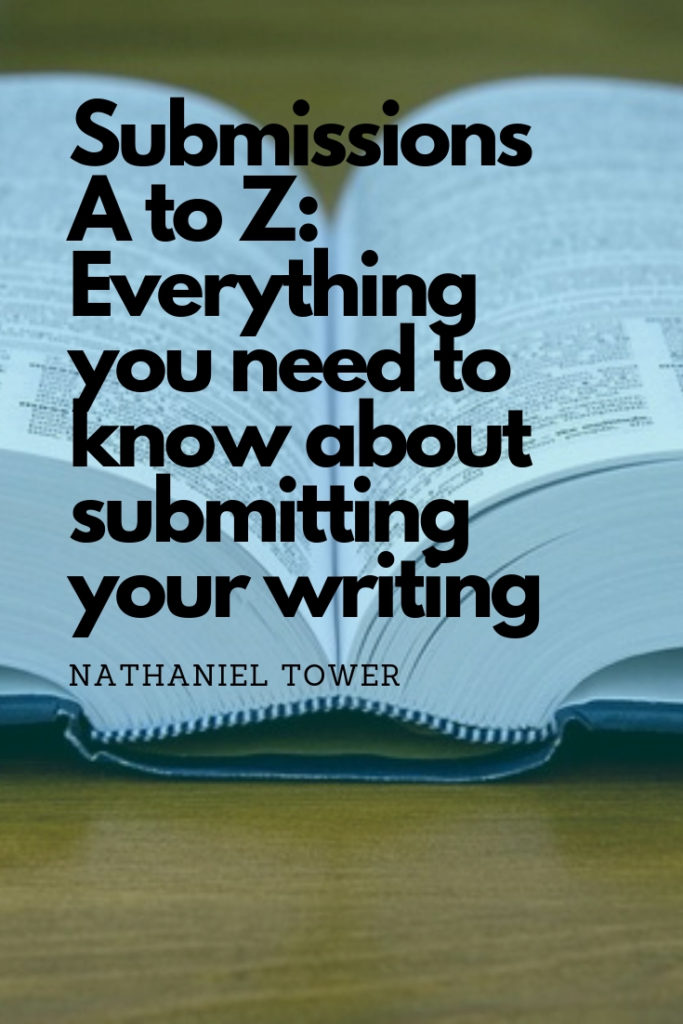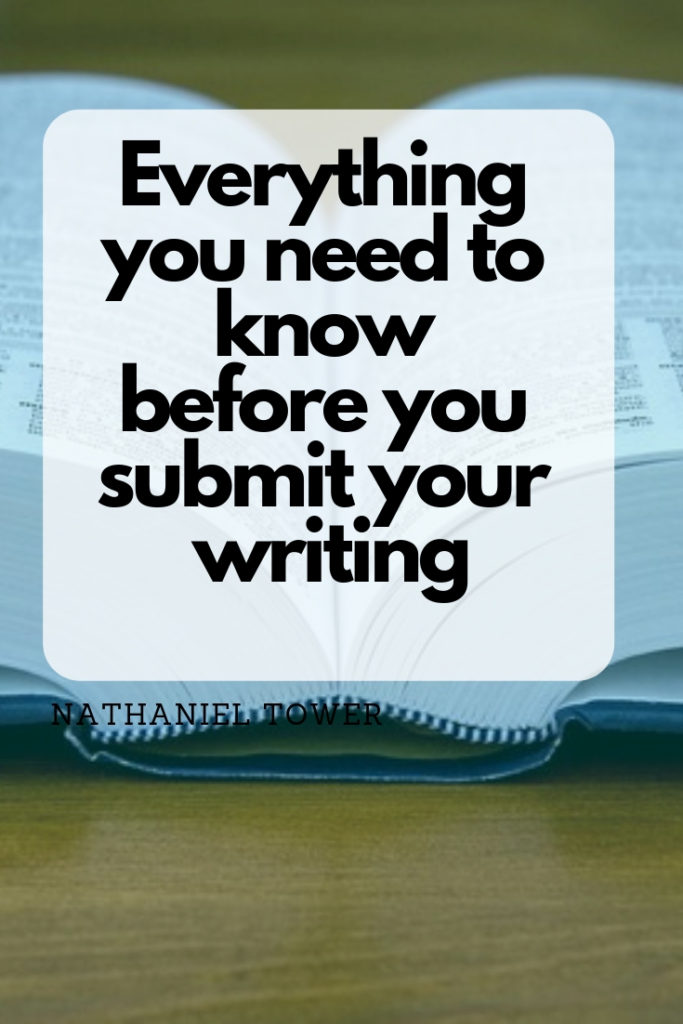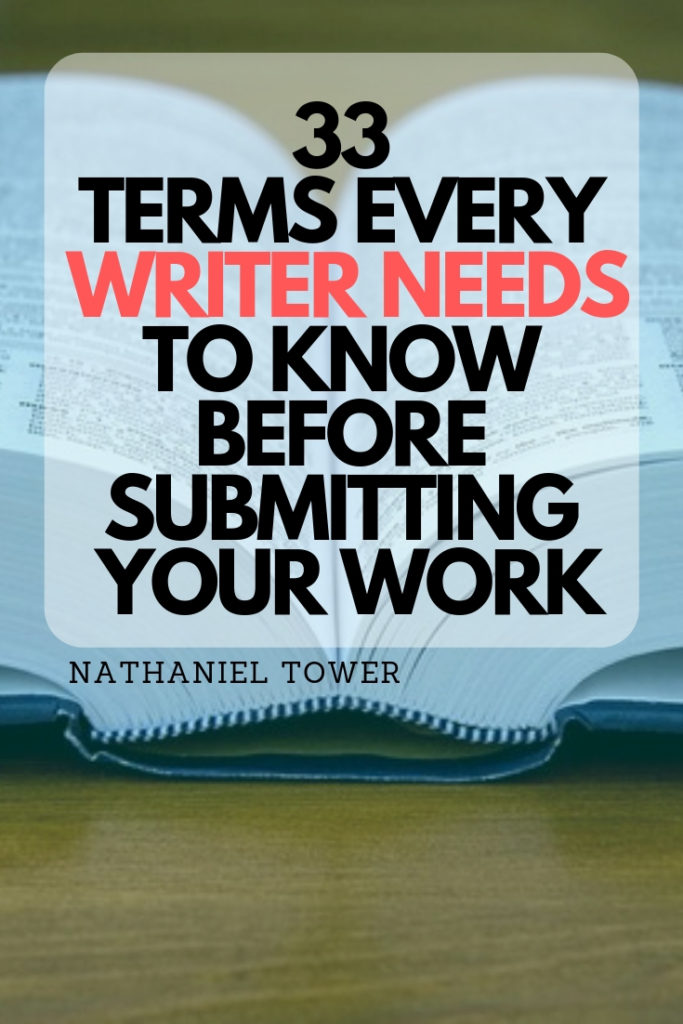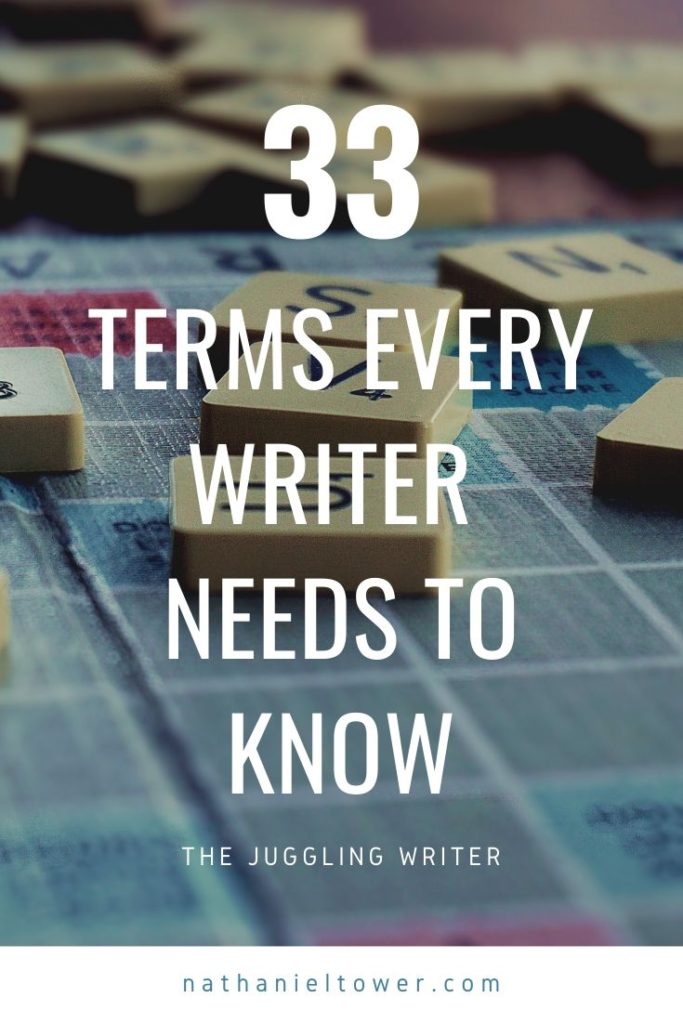Last Updated on July 10, 2020 by Nathaniel Tower
Getting your fiction or poetry published is hard work. But if you’ve done your homework, the process gets a lot easier. Here’s a complete list of terms you need to know if you plan to submit your work for publication.

Acceptance – When a publication decides to publish your work. An acceptance is often accompanied by a contract with the terms of publication, which may or may not include a payment. Some magazines will simply inform you that they are planning to publish your work without a formal contract.
Acceptance rate – The percentage of submissions that are accepted by a particular publication. Acceptance rates reported by websites such as Duotrope are historically inaccurate because of a tendency to under report rejections. However, some publications have a 0% acceptance rate, which is an indication that it is a very challenging market.
Aesthetic – The feel of a particular publication. Not every publication clearly defines its aesthetic, but many rejection letters include something along the lines of “this piece did not match our aesthetic.” It’s important to get a good feeling for a magazine’s aesthetic before sending them your work. You can accomplish this by reading what they’ve published in the past.
Contributor copy – A complimentary copy of a magazine or book provided to you because your work appears in it. Many print publications will pay their authors with contributor copies. Other publications will allow contributors to purchase copies for a reduced price.
Defunct – A magazine or publication that is no longer publishing new work. In some cases, the website stays up as an archive of previously published work, but you should not submit to these publications. Many magazines will shut down completely without a trace when they go defunct.
Duotrope – A popular website that allows you to track and report your submissions as well as find new markets to submit to. Duotrope used to be a free service but started requiring a paid subscription several years ago. It is widely considered the largest and best database for discovering new places to send your work.
Exposure – A “payment” offered by magazines that can’t afford to pay you. Rather than giving you money in exchange for your work, they are promising to get eyeballs on your writing. While this can be beneficial if the magazine has a large following, many publications only get a few dozen readers (or less) a month. Getting “exposure” often leads to nothing other than a publication credit.
Flash fiction – A very short story, typically defined as 1,000 words or less. Flash fiction has become massively popular as attention spans have seemingly decreased. Flash fiction typically contains the same elements as a traditional short story (beginning, middle, end, etc.) but is told in much fewer words.
Form rejection – When a publication declines to publish your piece and notifies you with a canned letter. This letter may contain the title of your story or your name, but the rest of the text is based on a pre-built template. A form rejection is not necessarily worse than a personalized rejection, but it usually means the publication is not immediately interested in seeing more of your work.
Guidelines – The specific set of submission rules of a particular magazine or publication. Submission guidelines range from a few lines about word count to very specific instructions on what and how to submit. It’s essential to follow all submission guidelines exactly when sending out your work. Violating the guidelines can lead to instant rejection.
In-progress – A status assigned to a submitted work once an action has been taken in Submittable. In-progress is often misunderstood and does not necessarily mean that someone has read or is actively considering your work.
Market – A publication or venue that publishes fiction, poetry, non-fiction, or other creative work.
Multiple submission – Sending more than one piece to a single publication at once. In other words, you will send multiple stories or poems to the same magazine at the same time. Many venues do not allow multiple submissions.
Personalized rejection – When a publication declines to publish your work but sends a personalized note that often includes feedback on your story or poem. A personal rejection can be encouraging but does not necessarily mean you are close to an acceptance.
Previously published work – Any story, poem, or other form of art that has appeared in any capacity on another website or in print. This includes being published on a personal blog or in a Facebook group. Most magazines do not accept previously published work.
Professional payment – A payment for your story or work that is typically 5 cents per word or greater. Only a small percentage of publications offer such a payment.
Query – Instead of a full submission, this is when you send a publication a brief note about what you want to submit. Some publications require you to query first in certain situations. A query can also be when you inquire about the status of your submission after a given amount of time. For example, if you haven’t heard from a publisher within 60 days, you might query to ask if they are still considering your submission.
Reprints – Any previously published work that is published again by another venue. Many publications do not allow reprints. Unless it is explicitly stated in the guidelines, you should not send previously published work to a magazine.
Response time – The typical amount of time it takes for a publication to respond to a submission. Some publications have a short response period of only a few days while others take months or even over a year to tell you if they are going to publish your story or not. Some publications will specifically state their typical response time in their guidelines.
Self-publication – When you choose to publish your work yourself rather than send it to an established publisher. While some people look down on self-publication, it is becoming more common and can be profitable.
Simultaneous submission – Sometimes confused with multiple submissions, a simultaneous submission occurs when the same piece of writing is being considered by more than one publication at the same time. In other words, you send the same story or poem out to multiple publishers and wait for a response. It’s important to keep track of your simultaneous submissions so you can be ready to withdraw in the event you receive an acceptance. Some publications do not accept simultaneous submissions.
Slush pile – The collective name for the “stack” of submissions a publication has received and is in the process of reading. Making it out of the slush pile means that the publication hasn’t rejected your work in the first round and is strongly considering it.
Standard manuscript format – The ideal way to format your manuscript. Standard manuscript format is widely accepted by most publications, although some venues have very specific guidelines that go against this standard format. Download your standard manuscript format template here.
Submission fee – When a publication requires you to submit a fee in order for them to consider your work for publication. Submission fees are becoming increasingly common as magazines find ways to pay the bills.
Submittable – An online submission manager that many literary magazines and other publications and organizations use to collect and manage submissions. Formerly called Submishmash, Submittable allows authors to submit their work and track their submissions to many different publications under the same account. Some previous submission managers required a separate login for every single publication.
Tip jar – A type of submission in which you give a small token payment to the publication as an appreciative gesture for reading your work. Many publications offer this option because they need to offset the cost of operating costs but they don’t want to require a submission fee.
Token Payment – A small cash payment, usually under $10, paid upon acceptance or publication of your work. Magazines that offer a token payment typically do so because they don’t have a large budget but want to support their authors.
Unacceptance – When a publication changes their mind after sending you an acceptance and decides not to publish your piece. Although uncommon, unacceptances can happen for a variety of reasons including a change in staff or a possible controversy.
Waiting period – A set amount of time you must wait before sending a publication another piece after you receive an acceptance or rejection. Many publications establish a waiting period such as 30 days in order to control the number of submissions they receive. It’s strongly recommended that authors wait at least a month before submitting another piece to a publication even if they don’t have a specified waiting period.
Withdraw – Pulling a piece out of consideration before the publication accepts or rejects it. This is typically done when you are simultaneously submitting and receive an acceptance from one publication. However, some people withdraw a submission for other reasons such as further editing or because they no longer want that story published. It is generally frowned upon to withdraw a submission for any reason other than an acceptance.
Word count – The minimum and maximum number of words your story or work should be in order to be considered by a publication. Most publications clearly outline their word count requirements. For example, a publication may specify that they accept stories up to 5,000 words. Others will give a range, such as between 1,000 and 3,000 words. You should never send out a submission that does not fall within the word count requirements.
Work-in-progress – The story or piece you are working on right now. Make sure you edit it thoroughly before sending it out!
Vanity press – A publication that offers no payment to its authors but requires them to pay to be published. In general, you should avoid these publications.
If you understand all of these terms, then you are more than ready to send out your work. Did I leave off an important submission word or phrase? Let me know in the comments and I will add it to this glossary.




What is the term for when you become an established and known writer and the magazine calls you up to ask you to write a story for them that they will pay you for??
I believe the term for that is “you made it.”